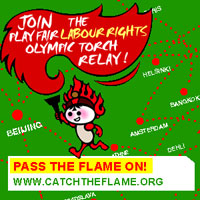|
Has the IOC taken responsibility for the labour conditions for products under Olympics license; products with the Olympic logo? Has the IOC turned into a progressive leader to improve labour conditions in the worldwide sportswear market?
Since 2003 - when the organizations coordinating the current Play Fair 2008 campaign initially approached the IOC with a request to discuss IOC responsibility for labour conditions in their supply chain -- there is not much progress to report. While many world records have been broken in these five years, both in sports and the marketing of Olympic logo goods and sportswear, the IOC has not made any serious attempt for a better record on labour conditions.
Play Fair has approached the IOC on numerous occasions and has suggested concrete actions to improve the conditions for workers at Olympic licensees. Play Fair's concerns, which have repeatedly been raised with the IOC since 2003, relate to the ongoing exploitation of workers in production of products under Olympics license in China and in other countries. The IOC itself has the possibility and the responsibility to exercise control over these working conditions, both directly through its own licensing and contractual arrangements with host cities and indirectly via National Olympic Committees. Report
In June 2007 Play Fair published a report entitled: No Medal for the Olympics on Labour Rights . In the report Play Fair documented first hand research taken from four factories that had been given Olympic licenses to produce Olympic goods. The findings in this report were extremely worrying - child labour, excessive working hours, routine underpayment of wages and blatant disregard for Chinese labour laws. More information on the situation at the four factories and the reactions of BOCOG, the four factories and follow up can be found here .
The IOC reacted to the report saying they are committed to social responsibility and ethical sourcing, however did not back this up with any concrete action regarding the Olympic licensees. They did not even comment on the findings of the report. At a meeting between the IOC and Play Fair on 19 December 2007, Play Fair explained once again its proposals, and also provided the IOC with a "road map" of key steps to make IOC ethical sourcing and social responsibility a reality. The road map sets out how the IOC should appoint a senior person on its staff responsible for social responsibility, how it should include workers' rights in the criteria for selecting host cities and in the contracts between the IOC and cities which are awarded the games, and also what kind of mechanisms are needed to monitor and evaluate compliance with labour standards, and deal with non-compliance. The Play Fair road map stresses the importance of freedom of association and collective bargaining, and also the need to provide workers in the sports merchandise sector with technical training and training on workers' rights.
Disappointingly, the IOC has not yet taken any concrete action, nor has it made any concrete suggestions for improvement. In its last letter sent to Play Fair on 31 March 2008, the IOC announced that it has strengthened its bid process with a new section on social responsibility which includes "elements on ethical sourcing among others" which should bear fruit for the 2016 Candidate City process. The IOC does not give any indication as to what this section might contain including whether it will indeed address labour issues in the production of Olympics merchandise. Nor does it say if the IOC will consult or involve others in this process.
It is also not clear if the IOC plans to undertake any action, whether in the form of contractual obligations or through other means, to ensure that the host cities of the Games before 2016 put the necessary requirements in place in respect to their licensing.
There is no good reason why workers in Olympics-licensed supply chains should have to wait yet another eight years for concrete action to be taken by the IOC. Play Fair sent a letter to the IOC on April 21st, urging the IOC to stop ducking and diving.
The IOC should take action, without any further delay, to improve the labour conditions in Olympic licensee production; action that will change the working lives of thousands of workers who are producing Olympic logo goods now and in the future. The IOC has the power and the influence to make these changes. The question is, does it have the will to turn its stated commitment to ethical sourcing and social responsibility into a reality?
|




